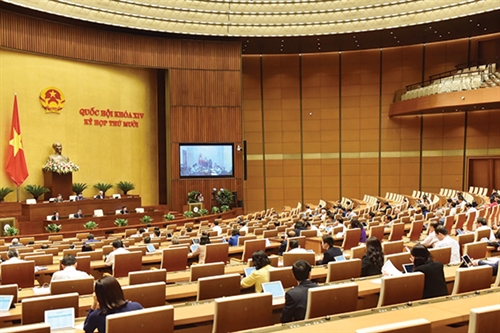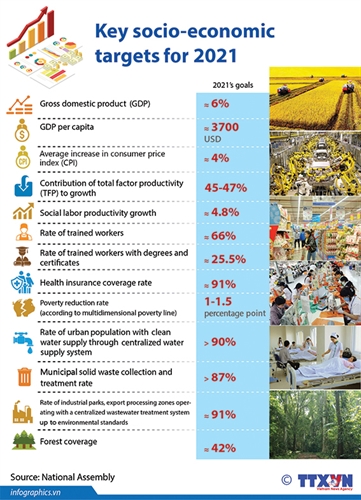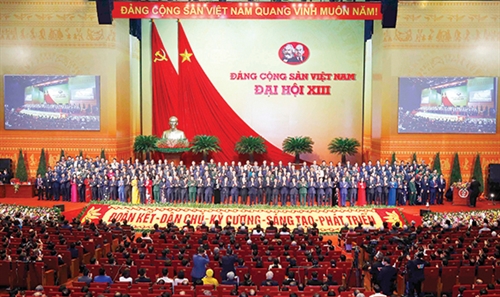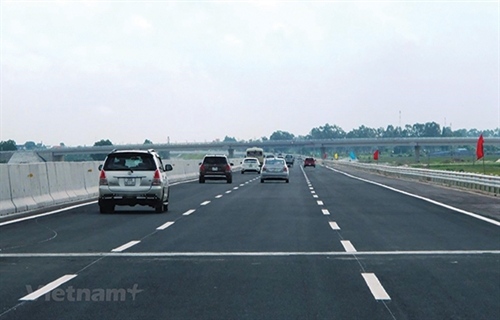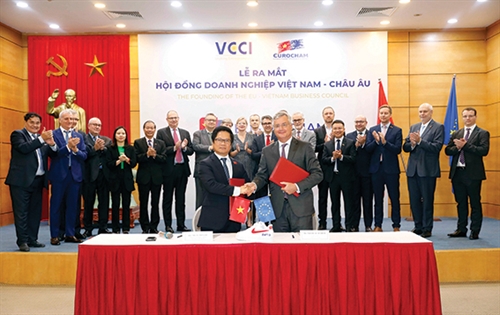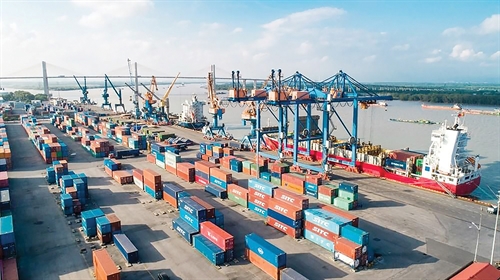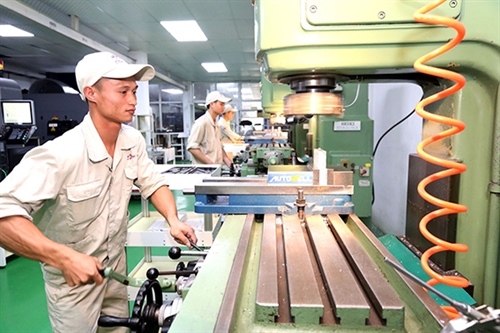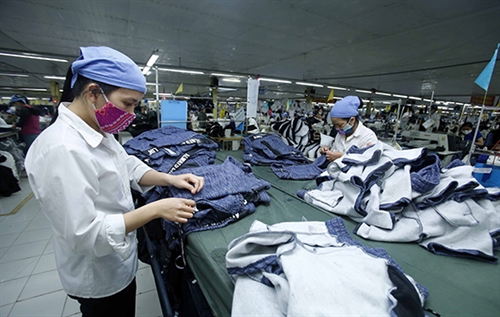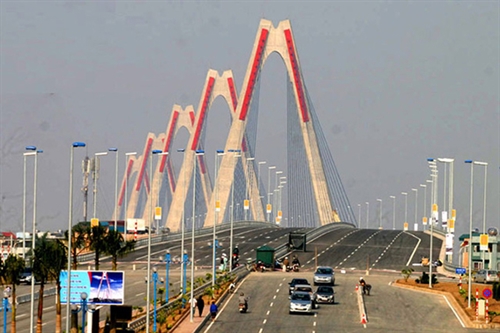The 11th sitting, the last meeting of the 14th National Assembly (NA), will devote much time to deciding on 25 leadership positions of the State, according to the agenda of the session which opened on March 24 and is expected to last until April 8.
These top leading positions include the President, Prime Minister, NA Chairperson, Vice President, Deputy Chairpersons of the NA and Heads of NA’s Committees, State Auditor General, Secretary General of the NA, Deputy Prime Ministers, ministers and other members of the cabinet, President and members of the National Election Council, and Deputy Chairperson and members of the National Defense and Security Council.
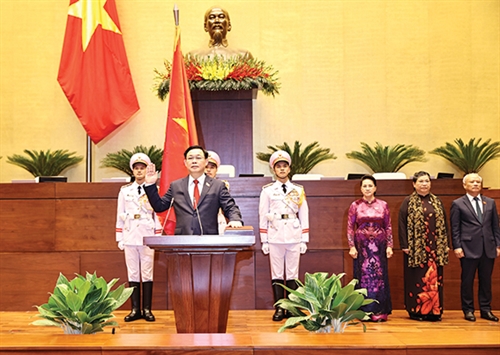 |
| Newly elected NA Chairman Vuong Dinh Hue takes the oath of office__Photo: Trong Duc/VNA |
Performance of the 14th NA reviewed
Presenting the draft report on the performance of the 14th Legislature, NA Chairwoman Nguyen Thi Kim Ngan said during the tenure, the Parliament has stepped up and improved the quality of lawmaking activities, creating a uniform legal foundation for the country’s fast and sustainable development, the safeguarding of national independence, sovereignty and security, and global integration.
The legislative body has intensified oversight activities while further reforming the method of oversight and focusing on pressing issues, Ngan said, noting the NA has made many important decisions that had great impacts on the country’s socio-economic life, development of mountainous and ethnic minority areas, national defense and security, and foreign relations.
External activities of the NA have also been carried out effectively, significantly contributing to the Party’s and the State’s diplomatic achievements, helping maintain a peaceful and stable environment for national construction and defense, and raising Vietnam’s stature in the international arena.
“We [NA deputies] should be proud of the contributions made by every deputy, every NA delegation and every NA Committee, for the benefit of the people and the nation,” Ngan said.
The achievements of the NA’s 14th tenure had left a strong foundation for the 15th term and beyond, said the top legislator.
Regarding question-and-answer activities held during NA sessions over the past five years, NA deputies and the public agreed the sessions had seen major changes with the format switched from discussion to open debate.
Deputy Vu Thi Luu Mai from Hanoi said the 14th Parliament had adopted a number of quality laws, ensuring transparency without “policy corruption”.
However, she warned that a lack of oversight in law enforcement might lead to the risk of “policy corruption” in some fields like ground clearance compensation, land pricing and land-use rights auction.
Mai proposed focusing on quality of policy analysis and asking for feedback from the people, businesses and those affected by policies before passing any law.
She also suggested the acceleration of the building of an e-government so that people no longer have to pay unofficial fees for administrative procedures.
According to deputy Nguyen Quoc Binh, policies constituted an intellectual resource and an important source of development, adding that proper policies issued at the right time promote the quick and sustainable socio-economic growth of the country.
To implement the Resolution adopted at the 13th National Party Congress, Vietnam’s economic growth from 2026 must reach double digits. The target can be attained if the Government and the political system adopt scientific, transparent, practical and breakthrough policies, meeting requirements to develop a circular, digital and sharing economy as well as requirements of the Fourth Industrial Revolution, Binh said.
“The NA needs to strengthen oversight over the promulgation of legal documents that are part of development policies. It is necessary to supervise the policy impact stage and policy-making process with regard to the promulgation and implementation of policies,” he said.
Meanwhile, Luu Binh Nhuong, deputy head of the NA’s Ombudsman Committee, said the NA should propose the 13th Party Central Committee to issue a resolution on strengthening capacity and efficiency of oversight activities of the NA, focusing on overseeing the mobilization of the national strength and resources.
He said some draft laws stirred public debate with their socio-economic impacts not fully evaluated in the domestic and international context, which could lead to unpredictable short-term and long-term consequences.
The policy analysis capacity of some NA deputies during the law-building process had not met requirements. Some simply adopted laws without spending time studying the drafts, Nhuong said.
Major issues on the session’s agenda
This final sitting of the 14th Legislature is also scheduled to look at work reports of the President, Government, NA Standing Committee, Ethnic Council and Committees of the NA, Supreme People’s Court, Supreme People’s Procuracy and State Audit Office of Vietnam during the 2016-21 tenure.
Based on these reports, the legislative body will consider and vote on a resolution assessing the performance of state agencies during the tenure.
The NA will decide on dismissal, election and approval of the appointment of holders of senior positions in the state apparatus in order to quickly meet requirements on implementation of the Resolution of the 13th National Party Congress, and to complete personnel work for the National Election Council to continue directing the election work.
Apart from voting on the revised Law on Drug Prevention and Control, legislators will also decide on the number of full-time deputies to the Hanoi People’s Council for the 2021-26 term.
They will listen to a report summing up opinions and petitions that voters and people nationwide send to the 11th session, and another on the supervision of the settlement of voters’ petitions sent to the 10th session.
The National Election Council will also report on its work since its inception.
Several Government reports, including one supplementing the assessment of the implementation of the 2020 socio-economic development plan, will also be tabled for discussion.
In the report on the President’s performance in the 2016-21 tenure, Party General Secretary and President Nguyen Phu Trong highlighted that the President had paid special attention to leading and steering Party building work and the building of a pure and strong political system.
He stressed the determination and persistence in the fight against corruption, waste and negative practices, which has been carried out in a drastic and effective manner since the tenure’s beginning.
The President’s work in the last tenure, together with the entire Party, people and army, has greatly helped bring into play the patriotic tradition and great national unity; build a clean and strong Party and political system; comprehensively and uniformly push ahead with the doi moi (renewal) process; strengthen the defense-security capacity to firmly safeguard the country’s independence, sovereignty, unity, territorial integrity, and sea and island sovereignty; and foster external relations and international integration in an increasingly extensive and intensive manner, thus promoting Vietnam’s profile in the region and the world, according to the report.
Proposing orientations and tasks for the time ahead, Trong emphasized that the President will keep exerting efforts to better perform the tasks regulated by the Constitution and laws, as well as the duties assigned by the Party Central Committee’s Politburo and Secretariat.
Delivering a report on the Government’s performance in the term, Prime Minister Nguyen Xuan Phuc said that one of the outstanding features of the Government’s leadership and management work is that the Government and Prime Minister have focused on directing sectors and authorities at all levels to actively conduct reform and take drastic actions, strictly follow the Party’s leadership and the National Assembly’s oversight, and fully perform tasks and exercise authority in line with the Constitution and law.
The Government has carried out strategic breakthroughs, especially those in completing the socialist-oriented market economic institutions, while exerting efforts to overcome difficulties through such measures as investing in raising the quality of human resources, generating nearly eight million jobs and putting the people at the center of innovation.
Phuc also summed up the tenure’s achievements in five main harmonious points.
Firstly, it is the harmony between stability and renewal, between following market rules and ensuring the socialist orientations, and in the relations among the State, the market and the society.
Secondly, harmony has been achieved in rapid economic development and assurance of social progress and environmental protection.
Thirdly, it is the harmony between internal and external strengths, between the domestic sector and foreign-invested sector, between domestic and foreign trade, and between building an independent and self-reliant economy and integrating into the world economy.
Fourthly, short-term priorities and long-term goals have been harmonized and, lastly, it is the harmonious combination in balancing national financial resources, budget funds and public debts, ensuring international payment balance and foreign exchange reserves, improving quality of human resources, and ensuring other macro balances.- (VLLF)
